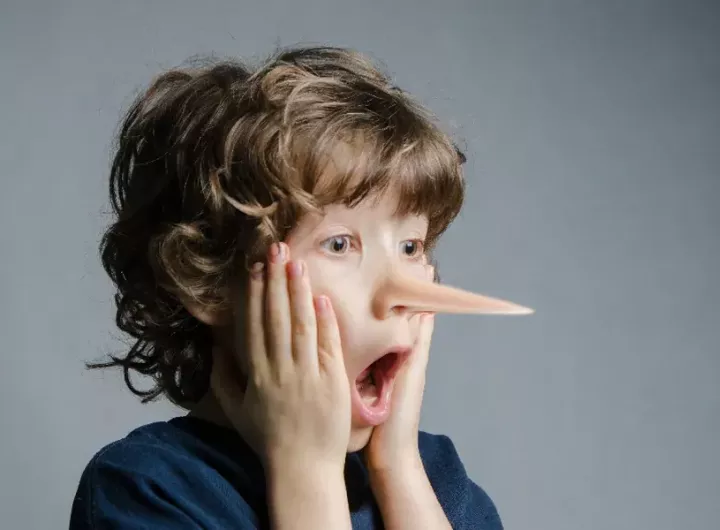
Fibs, whoppers and flat-out lies: What makes kids tell untruths?
How important is telling the truth? Even the most honest person might occasionally bend or omit the facts in order to spare someone’s feelings (also known as the ‘little white’ type of lie), and recently some have suggested we’re in a “post-truth” era. But still, most parents understand the importance of teaching children to be honest.
Why? Because deep down we know that deliberately misleading someone by saying something that is not true, especially to gain some advantage for ourselves, is unacceptable in any decent society. It undermines trust and healthy relationships. It can easily spiral out of control, as one lie leads to another. And it eats away at self-esteem.
There may be times when the subtleties of less-than-brutal honesty may appear contradictory to children (“But why did you tell Auntie Louise her cake was delicious when you said before it tasted like old socks?”). But ultimately, children need to learn that even when there may be consequences, they must still tell the truth. As they develop their sense of integrity and see that people trust and believe them, they grow to adulthood with confidence and feelings of self-worth.
HOW CAN YOU TELL WHEN KIDS ARE LYING?
Younger children sometimes give themselves away by telling a story that just doesn’t sound right, or smile or laugh nervously as their hastily concocted plot unravels.
If you think a child might be lying, a few simple questions can help reveal the truth. If you suspect your child has stolen money, for example, you might ask some calm, clear questions about the order of events, where they were and who was with them. Remember that a full-scale interrogation can be interpreted as a threat of punishment and may backfire, encouraging the child to retreat further into a lie. And keep an open mind – perhaps they really did find some money on the ground.
AGES AND STAGES
It’s important to understand that young preschool children sometimes mix up reality and fantasy, and may tell stories as though they really happened without intending to tell lies. This is quite normal as they test out ideas, learn different ways to express their thoughts and develop vital communication skills.
By about primary school age, children should know the difference between truth and fantasy. If they tell a lie, they know it and have a reason for it. So why would your child lie? There could be a number of reasons, such as:
- They’ve seen other people lie and get away with it. Maybe they’ve been a witness to a parent or grandparent not being honest when asked how much something cost, where they’ve been or why they haven’t done something. Or perhaps an older friend, sibling or cousin has denied wrongdoing when your child has seen with their own eyes what really happened. Kids may just be testing out the boundaries, and while this isn’t what you want, it’s understandable, especially if they’ve seen the apparent 'benefits' without the long-term negative consequences.
- They get extra attention and approval. Your child may make up stories about toys they don’t have, events that never took place or books they’ve never read, all of which may impress their peers (again, this is likely to only work in the short-term). Children who tell such boastful lies may also be lonely, bored, or have low self-esteem.
- They’re scared of the consequences. If a child thinks they’ll be severely or unfairly punished for doing something wrong, they may learn to avoid this by lying. This is where it can be a little tricky for parents, because if you don’t keep the two issues separate, kids can get confused.
LET YOUR KIDS KNOW HOW YOU FEEL
A recent study at the University of Michigan has found that when it comes to lying about a misdeed, kids are more likely to ‘fess up if they think their parents will be pleased that they’ve told the truth, even if there might be separate consequences for having done something wrong.
So it’s important to acknowledge that a child has told the truth, even when there are separate consequences for the misbehavior. If your child owns up to doing something wrong, make sure you praise them for their honesty before you deal with the misbehavior.
To discourage lying, parents need to discuss the problem with their children. Explain, in a very calm way, that lying is unacceptable; how it makes you feel when someone lies to you; and how it also creates problems for the person who is lying. You can also tell your child the benefits of being honest: Even though it can be hard sometimes to tell the truth, it lets people know you are honest and trustworthy. It feels good and helps you have better relationships with your family and friends.
GIVE THEM CHANCES TO BE TRUTHFUL
Give your child opportunities to be honest, and reward and praise them for telling the truth. This gives your child a positive response to their behavior, and helps make them more likely to repeat their honesty in future.
If your child is finding it hard to learn not to tell lies, you might need to set up a written contract signed by both yourself and your child. For more details on how to do this, you can talk to your Triple P provider as there’s a specific type of Triple P (Primary Care) that will help you with this. As your child learns to not lie, you’ll no longer need a written contract as you and your child will have established a more permanent contract of trust.